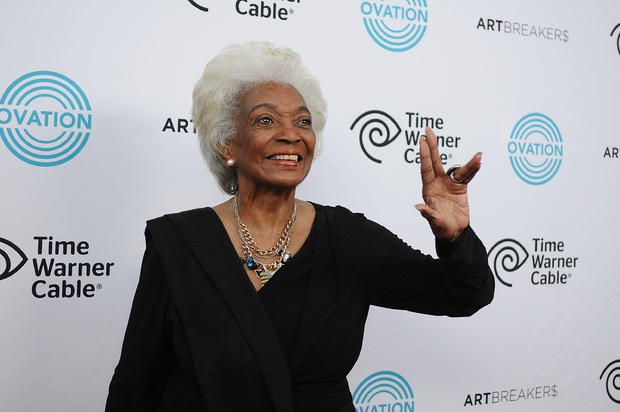Nichelle Nichols, who portrayed Uhura on “Star Trek” in a groundbreaking role for Black actresses before going on to help recruit people of color and women for NASA in real life, has died, her son announced on Facebook. She was 89.
“I regret to inform you that a great light in the firmament no longer shines for us as it has for so many years,” her son, Kyle Johnson, posted on Nichols’ official Facebook page. Nichols died of natural causes, according to Johnson.
“Her light however, like the ancient galaxies now being seen for the first time, will remain for us and future generations to enjoy, learn from, and draw inspiration. Hers was a life well lived and as such a model for us all,” he wrote.
After “Star Trek,” Nichols went on to become a recruiter for NASA, playing a key role in helping recruit people of color and female astronauts.
Civil rights attorney Ben Crump and director Todd Thompson, who both served as executive producers of the documentary “Women in Motion: Nichelle Nichols, Star Trek and the Remaking of NASA,” called her story “monumental.”
Nichols portrayed U.S.S. Enterprise communications officer Lt. Nyota Uhura on the “Star Trek” television series from 1966-1969. She also reprised the role in six movies from the iconic sci-fi franchise.
Araya Diaz/Getty Images for Ovation
Nichols was one of the first Black actresses to star in a primetime television show, and she and “Star Trek” made history with television’s first interracial kiss in 1968.
“She was the third-highest ranking member in the space command,” Crump told “CBS Saturday Morning” in 2021. “I mean, you talk about every little Black boy and girl running to the TV to say, ‘hello that’s a Black woman, and she’s in charge?'”
“Star Trek” suffered from poor ratings during its initial run and, according to “CBS Saturday Morning,” Nichols had been contemplating leaving the show after the first season to go to Broadway. But then she met Dr. Martin Luther King, Jr., a devout Trekkie, who pleaded with her to stay, saying it was the only show he watched with his children.
“He said, ‘you don’t understand the effect that you’re having, not only on Black people, not only on young women, but on everybody,'” she said in the documentary.
As “Star Trek” became more popular, members of NASA took notice — and had become fans, attending the “Star Trek” conventions. Nichols once gave a speech to members of NASA, and Crump said that she noticed there were no women or minorities in the audience.
“I said, ‘where are my people?'” Nichols said in the documentary. “I meant that then and I mean it now.”
The head of NASA was in the audience and took notice, offering her the opportunity to recruit for them. Nichols formed the company “Women in Motion,” traveling throughout the country to recruit women and people of color for NASA.
The effort paid off. In 1978, NASA recruited 35 people, including for the first time, six women and four people of color.
“This might sound a little corny, but it felt like my children,” she said in the “Women in Motion” documentary. “And my heart, it pounded. And I knew the world would never be the same again. We would go on to great heights — and to think I had the slightest thing to do with it makes me know that all things good are possible.”
